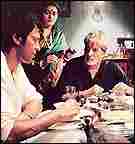Contribute
| Film Review - Sarkar |
Nirmala Garimella
09/08/2005
Family responsibility: A father's legacy: The need to earn respect: The corrupting influence of power. These are some of the ingredients combined in Ram Gopal Varma’s cinematic blender ‘Sarkar’. SARKAR is inspired by Mario Puzo's literary classic THE GODFATHER, which Francis Ford Coppola immortalized on the big screen in The film opens in the home of Subhash Nagare (Amitabh Bachchan,) the Godfather, who is holding court. Nagare aka Sarkar is listening to the heart-wrenching story of a hapless father [Virendra Saxena], whose daughter has been raped, while the rapist is acquitted by the law. The daughter, unable to bear the humiliation has committed suicide. Naturally, the father seeks revenge. Sarkar instructs his trusted lieutenant [Ravi Kale] to take the rapist to task. Sarkar’s younger son Shanker (Abhishek Bachchan) is back home from the Sarkar is a most complicated gangster. In his own words, he is not a killer, and he never mixes business with personal matters. He puts family first and despises displays of weakness. He understands the burden of power, and his wordless sympathy for Shanker when he is forced to assume the "throne", is one of Sarkar’s most revealing moments (about both father and son). Times are changing, and as much as Sarkar seems in control, his power is beginning to erode. By the standards of some, his views on the importance of family, loyalty, and respect are antiquated. But Sarkar will not compromise, even when a powerful gangster named Rashid (Zakir) arrives with promises of high profits for those who back him. Sarkar’s refusal to do business with Zakir strikes the first sparks of a war that will last long and cost many lives. New mobs emerge and betrayals take place, and the family is shaken to its roots by treachery from both within and without. The man with the most screen time is Shanker (Abhishek Bachchan) and his tale, because of its scope and breadth, is marginally dominant. His transformation from "innocent" bystander to central manipulator is the stuff of a Shakespearean tragedy. By the end, this man who claimed to be different from the rest of his family has become more ruthless than Sarkar ever was. Although the issues presented in Sarkar are universal in scope, the characters and setting are decidedly ethnic and local. But Ram Gopal Varma had decidedely taken a Coppola type of fascination for a ‘Mumbai mafia’ and woven it as yet another element of the many that make his picture a compelling experience. Except for the drumming of ‘Govinda, Govinda, Govinda’ at periodic intervals in the film and a late night show with a blaring sound system in a theatre in
You may also access this article through our web-site http://www.lokvani.com/


